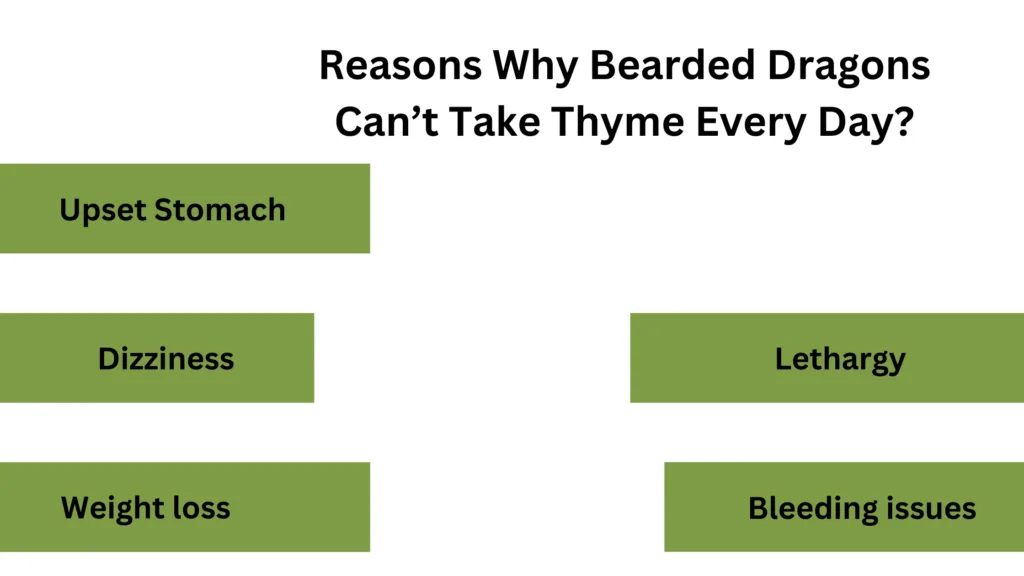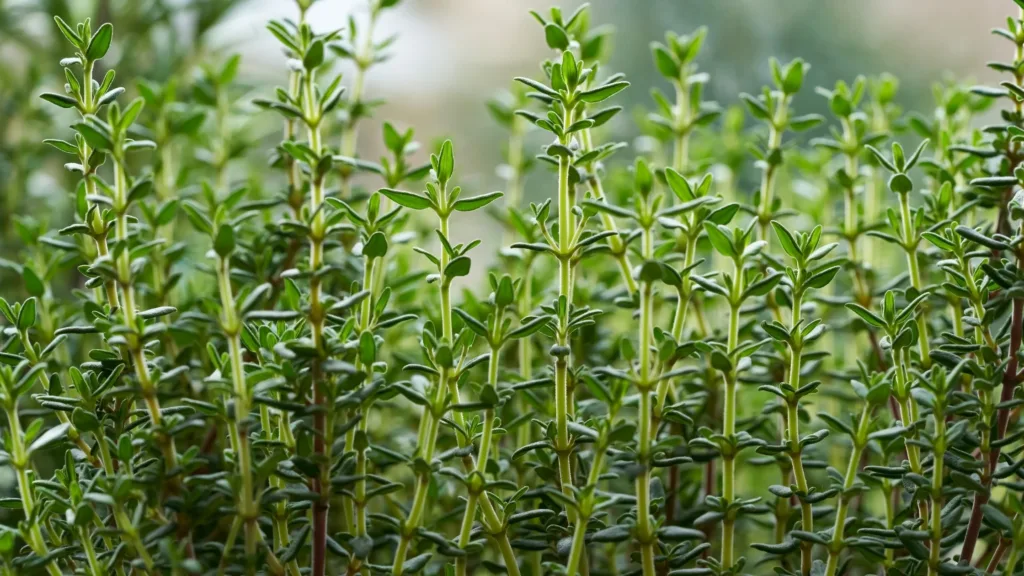Being a bearded dragon owner, you want your beardie to live a happy and long life. Bearded dragons need only veggies and bugs in their diet. Young bearded dragons need to eat 70% veggies and 30% bugs. Juvenile bearded dragons, on the other hand, must eat 70% bugs and 30% veggies.
Why this much protein? Well, that’s because they are in a growing stage. If they don’t eat protein right now, they will face varying problems throughout their life. That’s why it’s essential to take care of their diet. But sometimes to help your bearded dragon take more nutrients than they normally consume, it’s essential to give them some herbs. But can bearded dragons eat herbs? In other words, can bearded dragons eat thyme?
Well, yes. Bearded dragons can eat herbs. They can also eat thyme. That’s because it has antiviral, antibacterial, antifungal, as well as antiseptic properties. Bearded dragons need all these to prevent themselves from getting sick.
Can Bearded Dragons Eat All Herbs?
Well, no. Bearded dragons can’t eat herbs all the time. Some herbs that bearded dragons can eat include basil, chicory, cilantro, fennel, lemongrass, and rosemary. That’s because all these herbs have good calcium-to-phosphorus ratio. Bearded dragons need to eat only those foods that have more calcium than phosphorus. That’s because one of the most common diseases among bearded dragons is metabolic bone disease. In this disease, bearded dragons have difficulty walking. If left untreated, a bearded dragon can even die from this disease. But if caught early, bearded dragon can recover from this disease. There are three main causes of metabolic bone disease in bearded dragons:
- Calcium and vitamin deficiency
- Diet high in phosphorus and oxalates
- Wrong UVB lighting
What are the Benefits of Thyme for Bearded Dragons?
Thyme is rich in many nutrients, including calcium and iron. Apart from these benefits, there are other benefits of thyme for bearded dragon as well. Some of the benefits of thyme are:
1. Low Blood Pressure
Reptiles, specifically lizards, must maintain a blood pressure between 60 to 80 mm Hg. If they eat fruits that are high in potassium like watermelon and strawberries, then their blood pressure will increase. Some signs that shows that your bearded dragon’s blood pressure has increased include:
- Bulging eyes
- Swallowing of the lower jaw
- Softening of bones
2. Boost Immunity
Thyme is packed with many nutrients, including copper, fiber, iron, manganese, vitamin C, as well as vitamin A. The best part is that all these nutrients are required to boost bearded dragon’s immunity.
3. Fight Bacterial Infection
Apart from metabolic bone disease, another disease due to which bearded dragons get sick is respiratory infection. This happens because of the increasing number of viruses, fungi, bacteria, and parasites in bearded dragons. One of the advantages of thyme is that it can help prevent bacterial infection. In fact, according to one research, if you add a few drops of thyme oil to a bearded dragon’s food and then freeze it, their food will be protected from bacteria.
4. Prevent Growth of Cancer Cells
As per another study conducted in 2018 by a group of vets, both thyme and clove oil help prevent the growth of cancer cells in bearded dragons. This makes thyme one of the best herbs for bearded dragons. That’s because cancer, most specifically neuroendocrine gastric carcinomas, is prevalent in bearded dragons. Some signs that shows your bearded dragon has cancer include:
- Anorexia
- Weight loss
- Lethargy
- Hyperglycemia
- Collapse
What’s worse is that there aren’t known treatments for cancer in bearded dragons. One reason for this is that bearded dragons hide clinical signs. Their owners, in turn, get to know about their disease too late.
5. High in Antioxidants
Apart from calcium and supplements, bearded dragons do need antioxidants. That’s because antioxidants help them fight off free radicals that cause oxidative stress. In the long run, oxidative stress causes cell damage. Apart from that, antioxidants in thyme help bearded dragons in:
- Lowering risk of cancer
- Boosting immune health
- Promoting healthy heart and liver
- Maintaining blood pressure
6. Improves Blood Circulation
Thyme is rich in iron. That’s why it’s a perfect herb for ensuring the production of red blood cells in bearded dragons.
7. Helps in Digestion
Thyme reduces the production of gases and flatulence that cause stomach pain. It’s also said to improve the digestive health of bearded dragons. Thyme is also considered an antispasmodic. This makes it an ideal herb that can ease intestinal pain in bearded dragons.
8. Improves Bone Health
Thyme contains iron, calcium, manganese, as well as vitamin K. All of these nutrients are best for promoting bone health in bearded dragons.
9. Calms Nervous System
Thyme has carvacrol that’s good for calming the neurological system. Sometimes, bearded dragons can become stressed. In such situations, it’s ideal to give your bearded dragon something that’s relaxing.
10. Improves Vision
Thyme is high in vitamin A, a fat-soluble vitamin and antioxidant that reduces the effects of free radicals in the eyes. This also prevents macular degeneration and cataracts in bearded dragons.
11. Reduces Stress
Thyme has vitamin B6 which further has a direct influence on stress hormones of bearded dragons.
Can Bearded Dragons Eat Thyme Every Day?
Well, no. Bearded dragons shouldn’t eat thyme every day. That’s because at times it can cause allergic reactions, dizziness, as well as digestive issues. For this very reason, bearded dragons can’t eat thyme every day. Bearded dragon should only eat thyme every three or four weeks.
Reasons Why Bearded Dragons Can’t Take Thyme Every Day?
There are some herbs that bearded dragons can’t take every day. In the list of such herbs, thyme is also included. Bearded dragons can’t eat thyme every day because it can cause:
- Upset stomach
- Dizziness
- Lethargy
- Weight loss
- Bleeding issues

What are Some Toxic Herbs for Bearded Dragons?
No matter what happens, there are some herbs that bearded dragons should never eat. That’s because they are toxic. If bearded dragon accidently eat those herbs, then they can even die! Some of the toxic herbs for bearded dragons are:
- Bay Leaves – These leaves are part of the laurel family which is toxic to bearded dragons.
- Garlic – Garlic contains sulfur and thiosulfates that are toxic to bearded dragons. In case your bearded dragon has accidentally eaten garlic, it will get diarrhea, lethargy, vomiting, and weakness.
- Dill Leaves – It contains carvone as well as limonene that are really toxic to bearded dragons. Immediately consult your vet in case your bearded dragon has consumed dill leaves.
- Onion – This vegetable contains propyl disulphide that’s really toxic to bearded dragons. That’s partly because propyl disulphide breaks down red blood cells, which further leads to anemia.
- Chives – This herb has a natural deterrent called organosulfoxides that is poisonous to bearded dragons. Further, chives are toxic to bearded dragons no matter if they are cooked or not. So, be sure to consult a vet in case your bearded dragon has ingested chives.
Can You Grow Thyme Inside a Bearded Dragon’s Tank?
No. You shouldn’t grow thyme inside a bearded dragon’s tank. In fact, for better growth, thyme must be grown outside where there is plenty of sunlight and well-drained soil. That’s because, apart from water, they need a consistent 60 degrees Fahrenheit to grow.

Conclusion
Bearded dragons can eat thyme. That’s because it’s full of vitamins, iron, calcium, and manganese. But despite all this, bearded dragons can’t eat thyme every day. That’s because it can cause digestive issues in some beardies.


1 comment
[…] fact, herbs like lavender fennel, lemongrass, basil seeds, thyme, and chicory can also be eaten by bearded dragons. These herbs have some essential nutrients […]